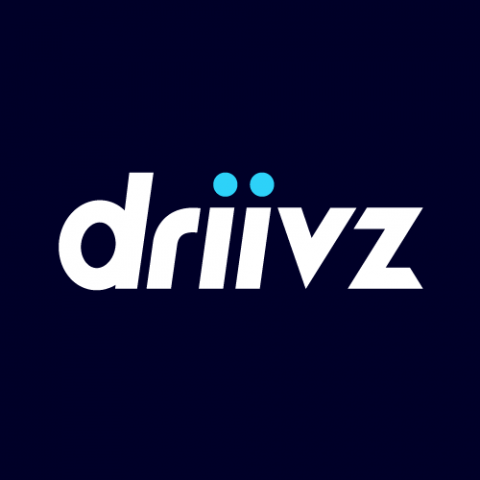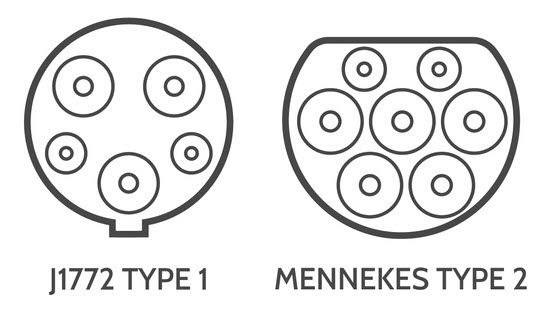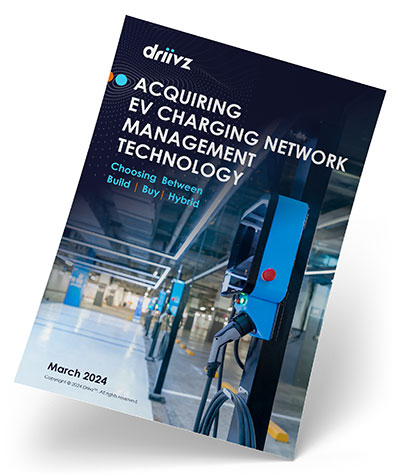EV Charging Protocols and Standards
The technology powering the EV charging industry has evolved so much over the last few years. As EVs become a natural part of the transportation ecosystem, we are witnessing a shift toward the standardization of chargers and the introduction of new industry protocols for interoperability. Now more than ever, it is particularly challenging to keep up with new developments and ensure that technologies comply with the latest regulations and standards.
Charge point operators and e-mobility service providers are facing challenges expanding internationally especially in dealing with different protocols, regulations, and multi-currencies, and integrating roaming capabilities into their networks.
In this blog post, we’ve put together a list of the EV charging industry standards and protocols which deliver the flexibility that is needed for the entire electric vehicle market. Standardization in the industry will be a key enabler of future EV charging infrastructure developments.
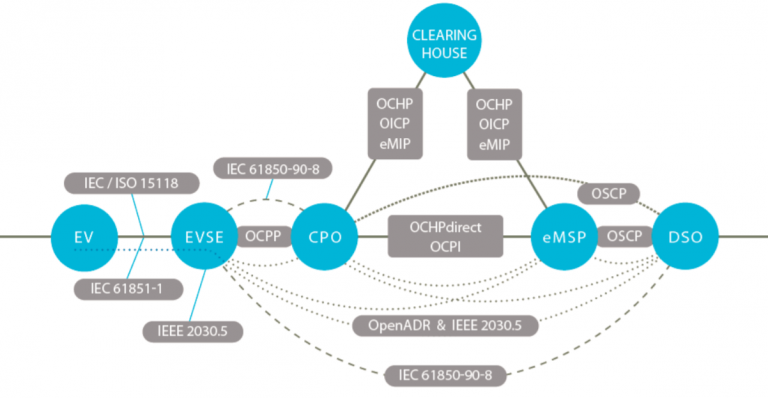
(Image source: ElaadNL EV related protocol study v1.1)
Type 1 and Type 2 Connectors
Type 1 connectors were primarily used in North America and Japan. Also known as SAE J1772 (because the standard is maintained by SAE International – formerly the Society of Automotive Engineers), or J plug for short, these connectors have 5 pins and can deliver up to 19.2 kW of power (80 A at 240 V) over single-phase AC line. The connector is locked to and released from the vehicle through a manual mechanism. Finalized in 2009, the connector was added to the IEC 62196 international standard for plugs, socket, outlets, vehicle connectors, and vehicle inlets.
Type 2 connectors were the European equivalent of the North American Type 1 and are often referred to as “Mennekes” after the German company that designed them.
Introduced in 2013, these connectors have 7 pins and can deliver up to 43 kW of power through a 70 A single-phase line or 63 A on a three-phase line at a maximum voltage of 500V. The higher power rating made it sufficient for rapid charging. These connectors use an automatic locking and release mechanism initiated by the driver Like Type 1, type 2 connectors were also added to the IEC 62196 standard.
Each of these connectors includes a Control Pilot (CP) line (specified in IEC 61851-1), which is used for communication between the vehicle and the charger using a Pluse Width Modulation (PWM) signal. A charging session is broken up into 6 states indicated by the voltage of the CP: Standby, Vehicle connected, Charging allowed, Ventilation, EVSE shut down, Error. For example, upon establishing a good connection between the EVSE and the vehicle, the CP voltage changes from 12V to 9V. The “duty cycle” (the length of the pulse) determines the maximum current that the EVSE can supply to the vehicle. For example, a 10% duty cycle indicates 6A are available while a 96% duty cycle indicates 65A are available for charging.
Since the introduction of the CCS standard, Type 1 and Type 2 connectors are being phased out and you would have a hard time finding one today.
CCS – Combined Charging System Standard
The Combined Charging System Standard (CCS) covers several aspects of EV charging including AC and DC charging, communications between the charging station and the vehicle, load balancing, authentication and authorization to charge, and the vehicle coupler (the connector at the end of the charging cable, and the corresponding inlet in the vehicle). The term “combined” refers to the fact the CCS essentially adds rapid DC charging through an extension of Type 1 and Type 2 AC connectors, resulting in Combo 1 (CCS1) and Combo 2 (CCS2) connectors respectively, which can provide up to 350 kW of power. CCS 1 connectors are the variety common in North America, while CCS 2 are found in Europe.
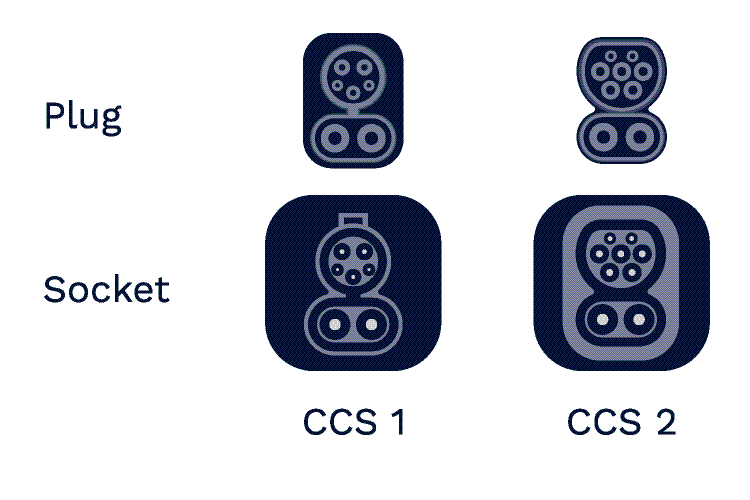
CCS Connectors
The CCS standard was introduced by seven automotive manufacturers (Audi, BMW, Daimler, Ford, General Motors, Porsche and Volkswagen) with the first prototype implementation demonstrated in May 2012. By 2014, the European Union adopted CCS2 as a requirement for EV charging networks. In the US, the first extensive CCS networks were completed along major corridors of the east and west coast in 2016.
Today, companies in the U.S. that want to enjoy some of the $7.5 billion in federal funding allocated for the national EV charging network must support CCS.
NACS – North American Charging Standard
Tesla has dominated the North American EV market since 2012. The company did not adopt the CCS standard that became common in the US and Europe, but rather, used its own proprietary charging system. In November 2022, Tesla made its specification publicly available and announced it as the North American Charging Standard – NACS. Tesla charging stations outnumber CCS charging stations compared to all other service providers combined, making it the most common standard in the US. Like the CCS Combo plugs, NACS offers both AC and DC charging in one plug, however, its capacity exceeds that of CCS and can provide up to 1MW of power on DC.
Both Ford and General Motors have announced that they will adopt the NACS standard, and the first NACS-compatible vehicles should roll off the GM and Ford assembly lines in 2025. Until then, GM and Ford drivers will have to use an adapter to connect to NACS chargers.
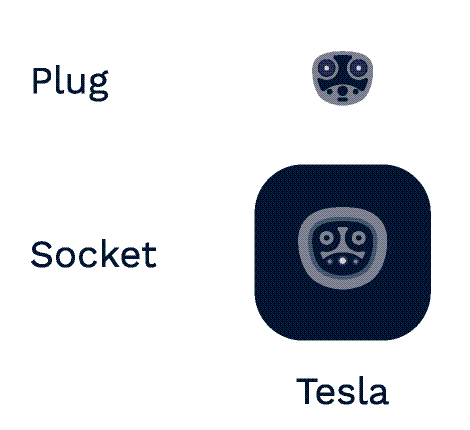
NACS (formerly Tesla) connector
OCPP – Open Charge Point Protocol
The Open Charge Point Protocol (OCPP) is an application protocol for communication between electric vehicle charging stations and a central management system. It is an international, open-source, vendor-independent standard which is available for free.
The protocol was developed by the Open Charge Alliance (OCA) for the EV infrastructure market, and is considered the de-facto standard for charging infrastructure interoperability among charging equipment manufacturers, software and systems providers, charging network operators and research organizations. The protocol is a proven way to optimize the cost and minimize the risk of networked infrastructure investments. It provides flexibility for infrastructure operators to be EVSE-agnostic and allows easy access for EV drivers.
Many key players in the EV industry (charging station manufacturers, utilities, charge point operators and back-office software providers) contributed to the development of the protocol.
The latest version, OCPP 2.0.1, has a lot of new and improved features for device management, transaction handling, security, smart charging functionalities, support for display and messaging and the extensibility of OCPP.
OCPP 2.0.1 also offers the option to support plug and charge for electric vehicles supporting the ISO 15118 protocol.
OCPP 2.0.1 was featured in one of the Open Charge Alliance Webinars.

ISO 15118 Standard – Bi-directional charging/discharging
ISO 15118 is an international standard for bi-directional digital communications between electric vehicles and the charging station. It defines a V2G communication interface for bi-directional charging/discharging of electric vehicles.
As a key enabler of the Plug & Charge capability, ISO 15118 allows EV drivers to insert the charge plug into the car, charge, and drive away when ready. This process is enabled by a digital certificate located in the vehicle, allowing it to communicate with the charging point management system (CPMS). This enables a seamless end-to-end charging process, which includes automatic authentication and billing, and avoids the need to use an RFID card, an app or to memorize PIN numbers.
EV Charging Roaming Protocols
OCPI – Open Charge Point Interface
The Open Charge Point Interface (OCPI) is designed for exchanging information about charge points between charge point operators and e-mobility service providers to enable scalable and automated EV roaming.
Supported use cases:
- Charge point information
- Authorizing charging sessions
- Tariffs
- Reservation
- Roaming
- Handling registrations
- Smart charging
The specification includes:
- Providing session information including location data
- Sending remote commands, for actions such as reservations
- Providing charge detail records (CDRs) for billing purposes
- Authorizing charging sessions by exchanging tokens
OCHP – Open Clearing House Protocol (e-clearing.net)
The Open Clearing House Protocol (OCHP) is an open-source protocol that enables simple and uniform communication between a charging management system and a clearing house system.
OCHP enables seamless electric vehicle charging across charging station networks (e-Roaming). Using OCHP, eMobility service providers can connect to EV charging operators and providers in order to provide access to their network.
OICP – Open Intercharge Protocol
OICP was developed by Hubject and is a communication standard implemented between e-mobility service provider (EMSP) and charge point operator (CPO) systems through the Hubject platform.
The protocol enables information exchange based on contractual relationships between EMSPs and CPOs to Hubject, allowing them to offer reliable roaming to electric vehicle drivers.
eMIP – eMobility Interoperation Protocol
eMIP, provided by GIREVE, enables roaming of charging services by providing a charge authorization and a data clearinghouse API and access to a comprehensive charging point database.
Energy Management Protocols
OpenADR – Open Automated Demand Response
OpenADR is an open and secured foundation for interoperable information exchange to facilitate automated demand response.
It is typically used to send information and signals between distribution system operators (DSOs), utilities and energy management and control systems to balance energy demand during peak times.
OpenADR 2.0 enables standardization of demand response (DR) and distributed energy resource (DER) communications and automated DR/DER processes. It also simplifies customer energy management and eliminates stranded assets.
OSCP – Open Smart Charging Protocol 1.0
OSCP is an open protocol for communications between a charge point management system and an energy management system of a site owner or a DSO system.
The protocol can be used to communicate a real-time prediction of the local electricity grid capacity to the charge point operator. OSCP facilitates capacity-based smart charging of EVs.
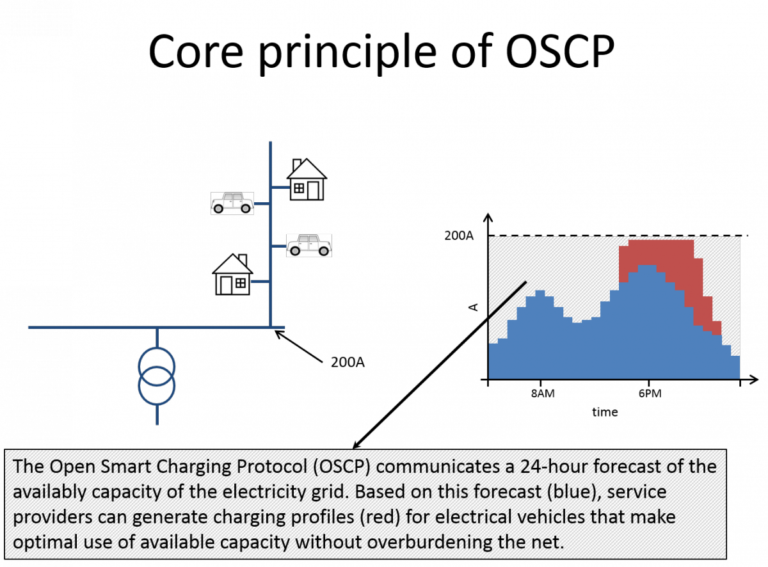
(Image source: OCA)
The Driivz platform is hardware-agnostic and based on open industry standards, supporting over 750 charger models.
- Driivz is one of the first companies to be formally certified for OCPP 2.0.1 by the Open Charge Alliance (golden node).
- Complies with ISO 15118 and OCPP 2.0.1 enabling vehicle-to-grid (V2G) communications.
- Driivz was one of the first vendors to provide full OCPI support (dating back to Nov 2018). In addition, Driivz was the first to integrate large networks in the USA (EVgo + ChargePoint).
- Industry-standard protocols – OCPI, OCHP, OICP (Hubject), eMIP, and more.
- Plug-n-charge – to improve the charging experience and avoid the need to use an RFID card.
- Autocharge – providing Plug & Charge like functionality based on vehicle MAC address.
- OpenADR certification
- Complies with Eichrecht, the German calibration law.
- Proprietary protocols – with tools to support and integrate any protocol.
